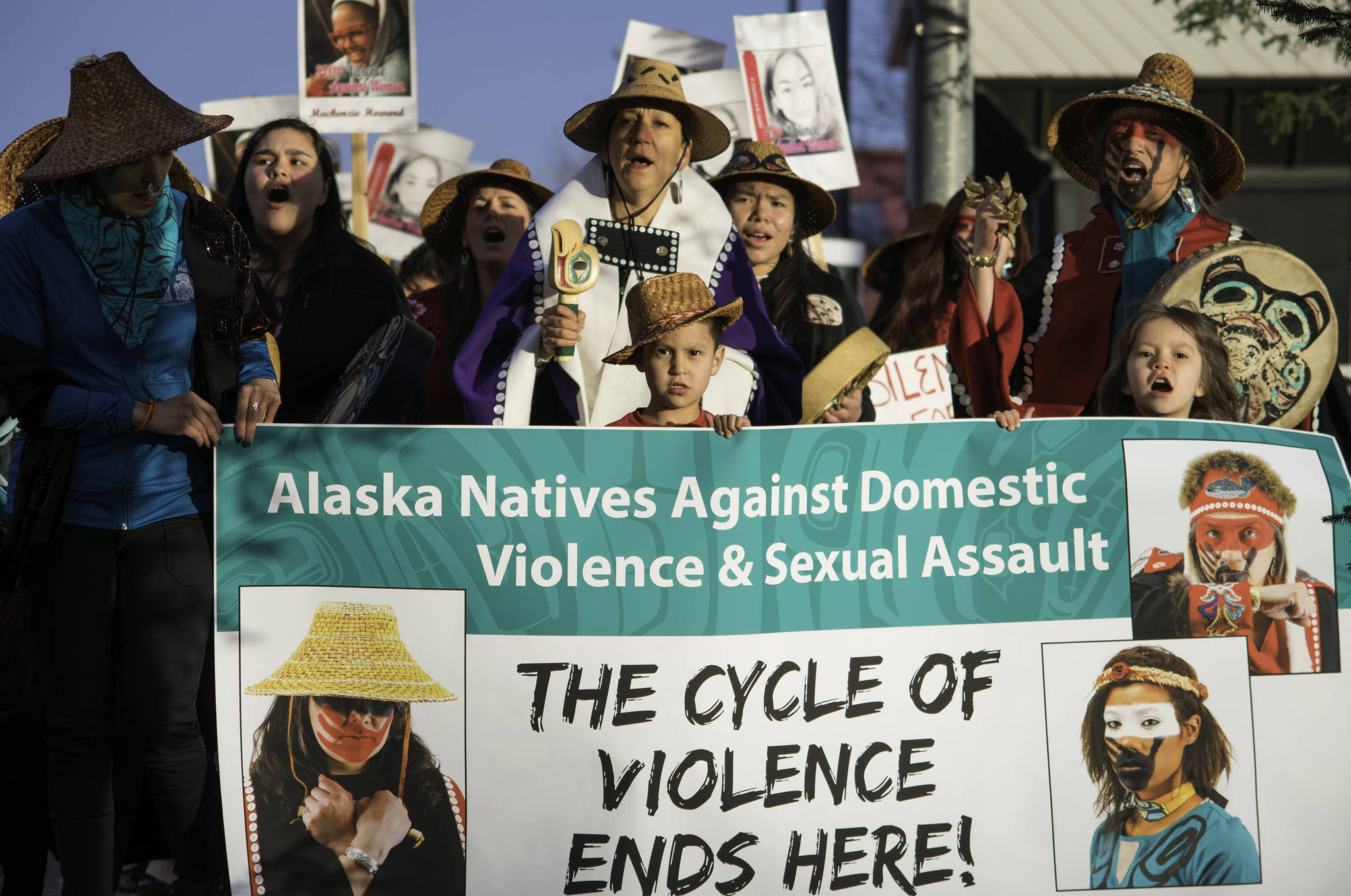Correction: An earlier version of this article characterized the death of Mackenzie H. Howard as an unsolved murder. A 14-year-old boy was arrested in connection with the case in 2013. This article has been updated to reflect the change.
The family of Mackenzie H. Howard, a 13-year-old Alaska Native girl believed to the victim of a 2013 murder, held up photos of their smiling relative, her wide smile framed by playfully oversized red glasses.
Howard was found dead in the backyard of a Kake, Alaska church in 2013. An unidentified 14-year-old male was arrested in connection with the crime 10 days later.
Demonstrators nearby joined in the “The Tired Paddler’s song.” The song is fitting for the Howard family. It’s a long journey for justice for the families of Alaska Native women, who experience rates of domestic violence up to 10 times higher than the national average.
Matthew Bell, Carmel Shaquanie and Nikki Lewis, each related to Howard, haven’t forgotten her.
“We remember her like it was yesterday. Being in a small community like that, we can’t forget,” Bell said.
The family spoke to the Empire on the margins of Friday’s Violence Against Women Awareness Rally at the Elizabeth Peratrovich Hall. Shaquanie had a band of red paint over her eyes and a black handprint over her mouth, symbolic of her message to “remind women that we can speak up,” she said.
Domestic violence in Alaska Native villages and small towns has long been a crisis. According to a 2016 study from the National Institute of Justice, more than four out of five Alaska Native and American Indian women (84.3 percent) report having experienced violence in their lifetime, compared to 71 percent non-Hispanic, or white, women. More than half, 56 percent, report having experienced sexual violence in their lifetime. Nearly 40 percent have experienced violence in the past year, including 14 percent who have experienced sexual violence in the last year.
If the numbers at Friday’s rally were any indication, the Alaska Native community is clamoring for the issue to come to the forefront. More than 250 turned up to march around the Willoughby District on Friday. Some held signs depicting an Alaska Native Wonder Woman, a traditional drum taking the place of the super hero’s shield. Others, like Bell, Shaquanie and Lewis, held photos of loved ones lost, or signs demanding change.
Michelle Demmert, a Tlingit woman from Klawock and a Washington attorney of 25 years, is the Chief Justice for the Central Council Tlingit and Haida Indian Tribes of Alaska. An Eagle of the Kaax’oos.hittaan clan, Demmert has worked with the newly-formed Alaska Native Women’s Resource Center to strengthen tribal justice and to lobby for law enforcement resources in Alaska’s Native villages, many of which do not have permanent law enforcement presence.
“Really, we would like to see local control over these issues,” Demmert said. “We don’t have the resources right now to do that. The state is not coming to our communities even though they are responsible for public safety.”
Alaska State Troopers have jurisdiction of many Alaska Native villages, including Klawock and Kake. About 75 such communities don’t have permanent law enforcement presence, according to a study from the Indian Law and Order Commission. Given Alaska’s size and harsh weather, sometimes troopers can’t reach a village until long after a crime has been committed. After the discovery of Howard’s body, Kake locals were left to guard the crime scene overnight as they waited for troopers to respond from Juneau, Demmert said.
“We’re trying to raise awareness that we are not treated the same,” Demmert said.
While demonstrators called for policy fixes, they also expressed the need for community dialogue and group healing to end the cycle of violence. Nancy Keen, or Skeenyaa Tlaa, a Raven-Coho, wore the same black hand-over-mouth facepaint many wore to the rally.
“We want to really focus on preventative measures, the education part. It’s really just a process of educating our people and bringing awareness to break the cycle,” Keen said. “That’s why the facepaint, it represents giving voice to those that have none. We have so many missing Indigenous women on the North American continent.”
David R. Boxley, a Tsimshian artist and totem pole carver, sang the “Lord’s Prayer” in Sm’algyax. He said he was fortunate to be raised with a strong anti-violence philosophy, something he hopes to impart as a role model.
“Bottom line is, you don’t show someone you love them by hurting them,” he said, adding, “But I think it’s about time more resources are put toward this. I think it’s time the problem is taken seriously by those in charge. They’ll say they are doing enough, but they clearly aren’t doing enough.
Tlingit and Haida’s Tribal Assembly met during the week in Juneau and passed several proposals aimed at combating violence against women. Judy Lee’s Law, named for the victim of an alleged 2016 unsolved Klawock murder, Demmert explained, will take away a parent’s custody rights if they are found responsible for the murder of another parent.
“Her crime has still yet to be prosecuted a year and a half later. We passed Judy Lee’s law, which says that if a parent is responsible for the murder of another parent, their parental rights can be terminated,” Demmert said.
CCTHITA also formed a “Violence Against Women and Men Task Force,” which Demmert said will, “track national issues and make our community aware of how we can collectively organize to improve the situation.”
• Contact reporter Kevin Gullufsen at 523-2228 or kgullufsen@juneauempire.com.

